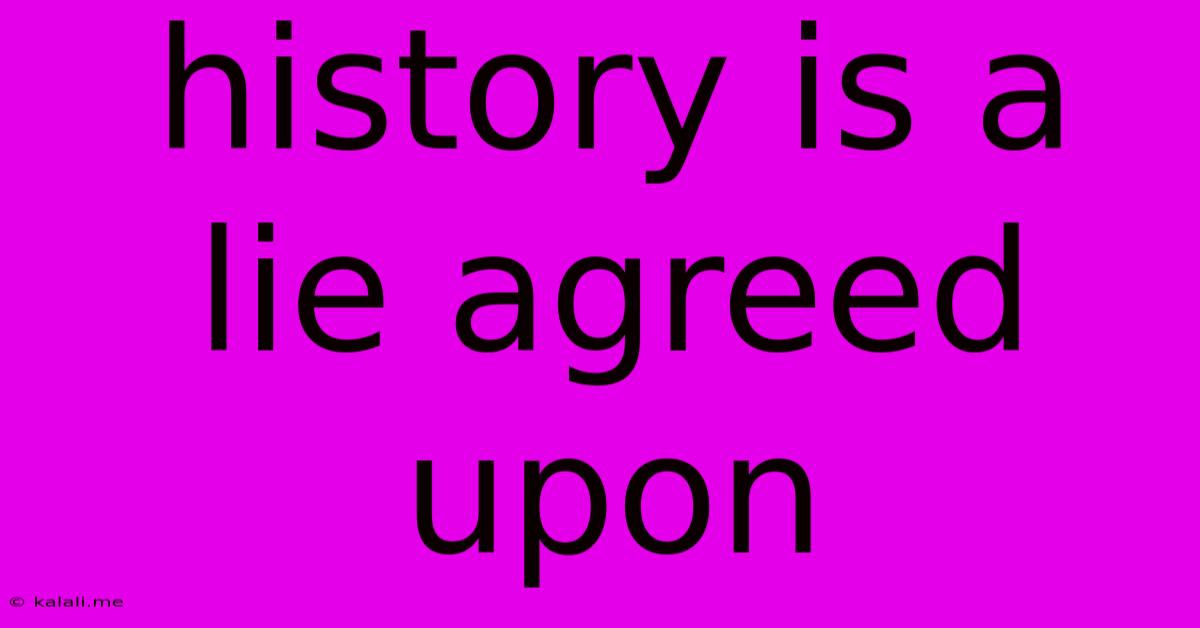History Is A Lie Agreed Upon
Kalali
Jun 07, 2025 · 3 min read

Table of Contents
History is a Lie Agreed Upon: Exploring the Subjectivity of Historical Narratives
The famous quote, often attributed to Napoleon, "History is a lie agreed upon," encapsulates a profound truth about the nature of historical accounts. While we strive for objectivity, the very act of recording and interpreting the past is inherently subjective, influenced by numerous factors. This article delves into the complexities of historical narratives, examining why the past is never truly neutral and how different perspectives shape our understanding of it.
Understanding the Subjectivity of Historical Interpretation
The phrase "history is a lie agreed upon" highlights the social construction of historical narratives. It emphasizes that what we consider historical "fact" is often a product of consensus, a shared agreement about a particular version of events. This consensus, however, is not immutable; it can shift and change over time as new evidence emerges, perspectives evolve, and power dynamics alter.
Several factors contribute to this subjectivity:
-
Selection Bias: Historians inherently select which events to include and which to omit, influenced by their own biases, the available sources, and the prevailing social and political climate. This selective process inevitably shapes the overall narrative.
-
Source Bias: Historical sources themselves are not neutral. Diaries, letters, official documents, and even archaeological artifacts are created within specific contexts and reflect the perspectives and biases of their creators. Understanding these biases is crucial to critically evaluating historical information.
-
Perspective and Interpretation: Different historians, with different backgrounds and ideologies, will interpret the same evidence in different ways. For example, a Marxist historian might interpret the French Revolution differently than a conservative historian, focusing on different aspects and drawing different conclusions.
-
Power Dynamics: The dominant narrative of history is often shaped by those in power. Groups with less power may have their stories marginalized or ignored completely, leading to an incomplete and potentially distorted picture of the past. This is especially relevant in understanding colonial histories and the narratives of marginalized communities.
-
Nationalism and Ideology: Nationalistic sentiments and prevailing ideologies significantly influence how historical events are framed and understood. The interpretation of wars, revolutions, and social movements often reflects the values and beliefs of the nation or group promoting the particular narrative.
The Importance of Critical Historical Thinking
Recognizing the inherent subjectivity of history doesn't mean we should abandon the study of the past. Instead, it emphasizes the importance of critical historical thinking. This involves:
-
Examining multiple sources: Avoid relying on a single source or perspective. Compare and contrast accounts from different viewpoints to gain a more comprehensive understanding.
-
Identifying bias: Be aware of the potential biases present in all historical sources, including your own.
-
Considering context: Understand the historical context in which events occurred and the social, political, and economic factors that shaped them.
-
Understanding power dynamics: Analyze how power relations influenced the creation and dissemination of historical narratives.
-
Acknowledging alternative perspectives: Seek out and incorporate different interpretations of historical events, especially those from marginalized groups.
Conclusion: Towards a More Nuanced Understanding of History
"History is a lie agreed upon" serves as a powerful reminder that historical narratives are not objective truths but rather interpretations of the past, shaped by a complex interplay of factors. By embracing critical thinking and acknowledging the inherent subjectivity of historical accounts, we can move towards a more nuanced and comprehensive understanding of the past, one that recognizes the multiplicity of voices and experiences that have shaped our world. This allows for a richer and more complete historical record, moving beyond simplistic narratives and acknowledging the complexities of the past.
Latest Posts
Latest Posts
-
Analytical Database The Manager May Want To Know
Jun 07, 2025
-
Can You Put A Backpack In The Dryer
Jun 07, 2025
-
How To Clean A Rug Without A Vacuum
Jun 07, 2025
-
How Much Minced Onion Equals 1 Onion
Jun 07, 2025
-
Difference Between 2 Stroke And 4 Stroke Engine
Jun 07, 2025
Related Post
Thank you for visiting our website which covers about History Is A Lie Agreed Upon . We hope the information provided has been useful to you. Feel free to contact us if you have any questions or need further assistance. See you next time and don't miss to bookmark.